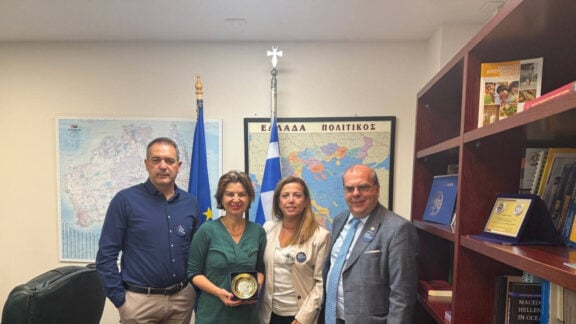“There is definitely a case to be made for Australia’s flag carrier Qantas to open a non-stop route to Athens,” says the Australian Ambassador to Greece, who has pledged her support for the proposal.
“I’m not the first – the Greek diaspora has been pushing for this – but I reached out to Qantas directly once I came to Greece [in 2023], to make the case for a direct flight between Australia and Athens.
“And when I visit Australia this summer, I’ll be aiming to speak to Qantas again,” Alison Duncan told Neos Kosmos.
The airline is already operating long-haul direct flights from Perth to three European destinations, London, Paris and a seasonal route to Rome.
And it’s not news that Athens could potentially follow.

Last year, in a media round table ahead of the launch flight from Perth to Paris, Qantas CEO Vanessa Hudson suggested a route to Athens was being considered.
“Every person I speak to at the moment is going to Greece, but again, when we have the aircraft, that is when we make the decisions on if and whether it’s all-round or seasonal,” Hudson reportedly stated.
Passenger demand for flights to Greece has remained strong in the post-COVID Australian market.
In a 2023-2024 study by the Institute of the Greek Tourism Confederation (INSETE), Greece ranked 10th in preferences for traveling abroad by Australians.
Non-comprehensive data released by INSETE (excluding for example cruise-related arrivals) recorded a total of 289,000 arrivals from Australia in 2023, a sharp year-to-year increase from 112,000 arrivals in 2022.

Asked by Neos Kosmos whether Qantas believes there is a viable market for an Athens direct route, Ambassador Duncan replied that many factors are in play.
“Airlines have to think about many things in addition to demand, such as what kind of aircraft they have available. They don’t just have aircraft sitting idle waiting for a new route. What slots can they get at airports? And if they have an aircraft available, what is the most commercially viable route?”
Timing could work in favour of an Athens direct pitch, as the airline prepares to advance its fleet with a reported delivery of 12 Airbus A350-1000 planes.
Speaking on the sidelines of an Airbus event in France last month, the Qantas’ CEO said that the first plane batch, expected at the end of 2026, would be assigned to launching ultra long-haul flights from Sydney to London and New York.
As reported by Financial Times, no decision was announced about which route would be launched first nor any other routes were named for the remaining aircraft.
“We will need three aircraft to be able to have a daily service, either from Sydney to New York or Sydney to London. Then, as the other aircraft come on, we’ll be able to fill out the network,” Hudson reportedly said.

Ambassador Duncan says she “wouldn’t want to raise people’s expectations” but believes the Greek Australian community could leverage the industry shift to ultra long-haul flights.
Qantas’ current 17.5-hour journey from Perth to London is the world’s third longest flight.
“One of the issues, of course, is that it would be a very long flight and not everyone wants to sit on a plane for 18 hours.
“But I understand that the direct flights Qantas currently has to London, Paris and Rome are well subscribed. So clearly there is a market for this.
“There’s a lot of lobbying coming from the Greek Australian community, and the more lobbying the better, because obviously Qantas isn’t going to take a decision without knowing there’s going to be demand.”
Double taxation: will talks progress once FTA negotiations resume?
Duncan’s appointment in 2023 as Ambassador to Greece, with concurrent, non-resident accreditation to Bulgaria and Romania, was a move away from her usual postings.
A senior career diplomat for over 20 years, her overseas service has previously been in the Indo-Pacific region.
“I’m an Indonesia specialist and I’ve worked a lot on the Pacific as well.”
But pursuing a European posting was a purposeful choice, she says.
“It’s important to raise awareness in Europe about the interlinkages between the Indo-Pacific and the Euro-Atlantic, from a geopolitical perspective, but also from an economic perspective.
“It can be hard to see why what happens in the South China Sea, for example, matters to Europe. But the reality is that 40 per cent of the world’s trade goes through the South China Sea.
“This is important for a shipping nation like Greece.”
Unless instructed otherwise, Duncan’s posting in Greece is set to conclude in 2026.
By then, she “would love to see” a double taxation treaty with Greece and Australia’s Free Trade Agreement (FTA) with the European Union finalised.
Trade talks between Australia and the EU for an FTA broke down in mid 2023 with market access for agriculture proving a sticking point.
“At that point, the offer that was on the table wasn’t one that Australia could accept,” Duncan says.
Last month, during the election campaign period, direct communications between Trade Minister Don Farrell and his EU counterpart, Commissioner for Trade, Maroš Šefčovič, indicated the two-year negotiation stall is about to break.

Speaking to the Sydney Morning Herald, EU Commission trade spokesperson Olof Gill had said discussions were “positive and constructive” and came about at Australia’s request.
Minister Farrell had stated they “agreed to resume talks face to face as soon as we can after the election.”
Bilateral taxation talks were paused when issues emerged that needed to also be addressed in the FTA, Duncan explains.
“Both sides agreed at the time that we should focus on the FTA first and work out any issues there relevant to a tax agreement.”
But when FTA negotiations stalled, the Australian Ambassador approached Greek Ministers to restart tax treaty talks.
“Officials have been once again exchanging information and we hope that we’ll be able to move forward to complete these negotiations,” Duncan told Neos Kosmos.
“A double tax agreement is the key thing that’s missing from our financial arrangements with Greece. And it would be very helpful both to business and individuals.”









